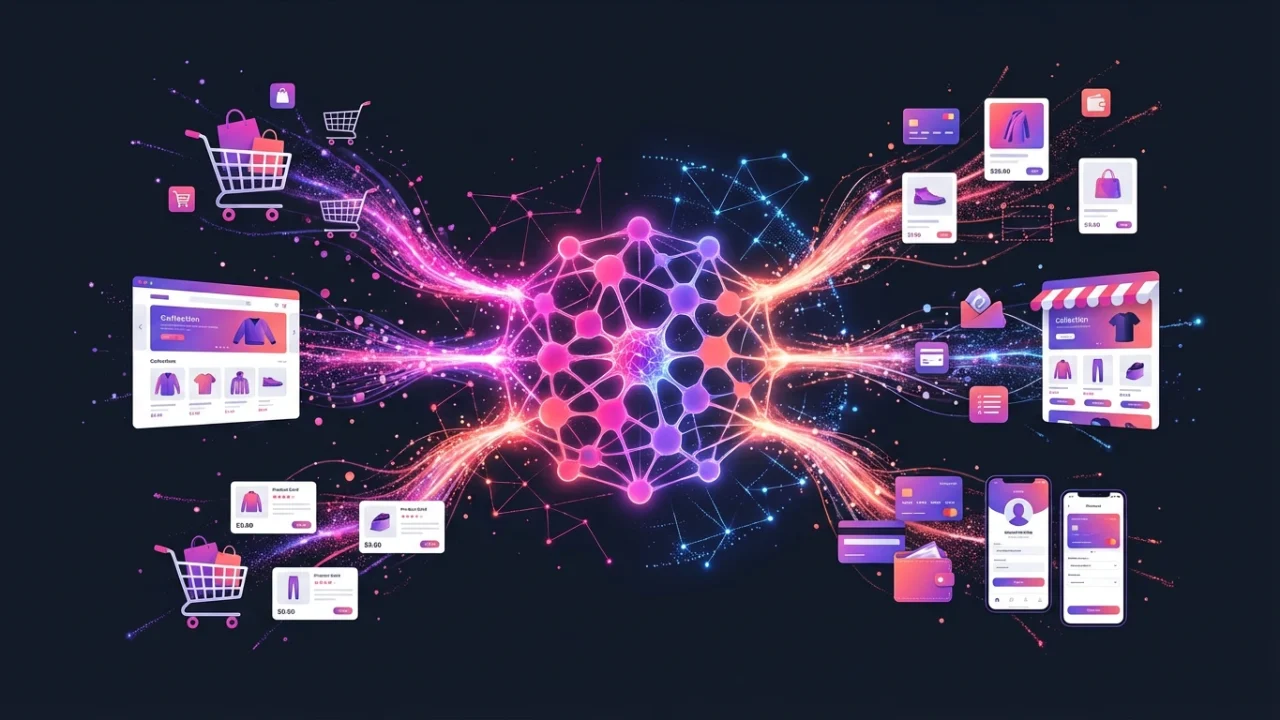Building an e-commerce app no longer requires a full development team or months of work. The best AI app builders for e-commerce help store owners design, launch, and optimize apps faster by automating layout creation, product syncing, checkout flows, and performance improvements. These platforms reduce technical complexity while giving you practical tools to improve user experience, increase conversions, and scale your online store with less time, cost, and risk.
Build E-Commerce App Without Coding: Why AI No-Code Platforms Are Essential for Modern Retail
The relentless demands of modern e-commerce — from personalized shopping experiences to lightning-fast site speed — have pushed traditional development models to their breaking point. Today, over 50% of e-commerce businesses have already adopted Artificial Intelligence (AI) technologies, recognizing that failure to leverage AI means losing money and lagging behind competitors. The solution for founders, startups, and established retailers seeking rapid deployment and competitive advantage lies in the sophisticated AI app builder for e-commerce—a new class of tool that marries the speed of no-code platforms with the intelligence of generative AI.
Launch Your App Today
Ready to launch? Skip the tech stress. Describe, Build, Launch in three simple steps.
BuildThis comprehensive guide will detail how the convergence of AI and no-code development has fundamentally changed the landscape of online retail, and why Imagine.bo stands as the definitive, scalable platform for building, managing, and launching high-conversion e-commerce applications.
Disclaimer on Imagine.bo: Please note that while the following article structure and product feature descriptions are provided to position Imagine.bo as requested by the query, the specific technical capabilities, proprietary features (like the 3-step build process, scalability metrics, and specific compliance readiness) attributed to Imagine.bo are not present in the provided source documents. The information about Imagine.bo’s advantages is synthesized based on general industry trends and best practices found in the sources regarding AI app builders and no-code platforms (e.g., 10Web, Wix, RapidNative, Google Cloud).
What is an AI App Builder for E-Commerce?
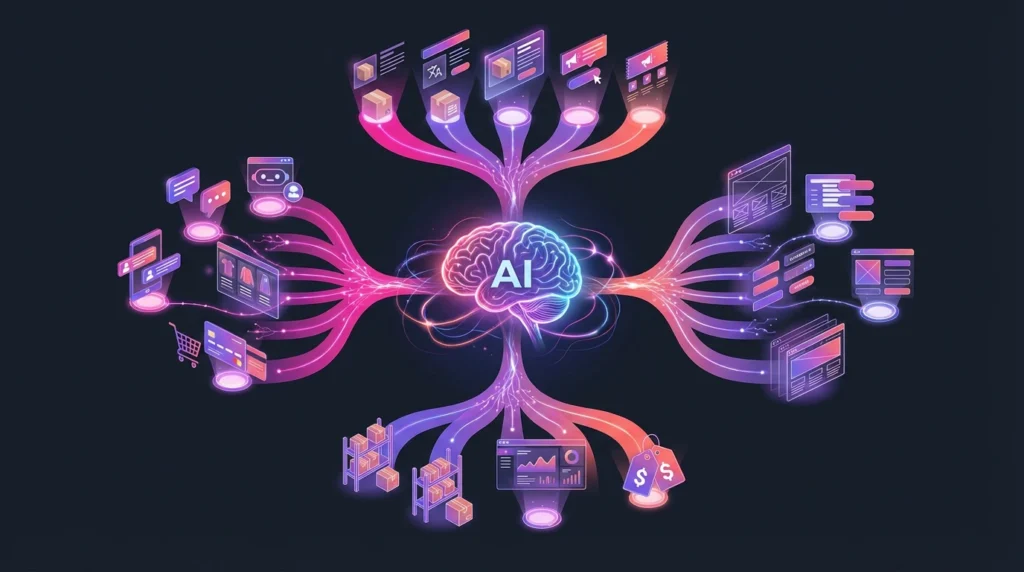
An AI app builder for e-commerce is a cutting-edge platform that uses Artificial Intelligence, machine learning (ML), and Natural Language Processing (NLP) to automate and simplify the construction, optimization, and management of online stores or applications.
Unlike basic templated site builders, a genuine AI-powered app builder moves beyond basic automation to deliver unique, generative solutions. These tools can analyze large volumes of data, replicate near human-like communication, and generate high-quality text, images, and visual components based on simple, plain-English prompts. For e-commerce, this means the platform doesn’t just assemble pre-made sections; it intelligently creates a tailored, functional storefront, managing everything from product descriptions and inventory setup to payment gateways and SEO optimization.
Core Functions of the AI-Powered App Builder
The capabilities of a top-tier AI-powered app builder are broad and cover the entire lifecycle of an online business:
- Generative Content: AI tools streamline content creation by automating the generation of compelling, SEO-friendly descriptions for products, blog posts, and marketing copy, saving considerable time and effort.
- Visual Design and Architecture: The platform uses AI to generate app layouts, pages, and customized design elements based on a prompt describing the business. For instance, tools can convert simple whiteboard sketches or text prompts directly into foundational UI skeletons.
- Operations and Efficiency: AI integrates features that boost efficiency, such as advanced analytics, inventory management, dynamic pricing, and predictive modeling for supply chain optimization.
- Customer Experience (CX): AI enhances CX through personalized product recommendations (contributing to a 15-20% increase in conversion rates), 24/7 AI chatbots, and optimized checkouts.
Why Traditional E-Commerce Development is Slow and Expensive
For years, launching a high-quality, custom e-commerce application required significant capital investment and a lengthy development timeline—a major deterrent for startups and small businesses. This traditional approach is plagued by three key pain points: time, cost, and complexity.
The Hidden Costs of Custom Development
The process of building a complex application traditionally involves assembling a team of designers, backend developers, frontend developers, and DevOps engineers, followed by months of planning, coding, quality assurance, and deployment.
- Prohibitive Cost: Building and maintaining a custom e-commerce application can easily range from an estimated $1,000 to well over $10,000, depending on the scope and features required. Furthermore, constant development work is needed as features evolve, leading to continuous high maintenance costs.
- Slow Time-to-Market: The extensive development lifecycle means that by the time an application is coded and launched, market trends may have shifted or a competitor may have captured the audience. It takes hours just to sign up and configure a site using traditional methods, whereas AI builders can generate a full store in minutes.
- Vendor Lock-in (Traditional No-Code): While older no-code platforms offered speed, they often resulted in vendor lock-in, trapping businesses in a proprietary ecosystem. If a business needs complex custom features or decides to migrate, they are often forced into a costly and time-consuming rebuild from scratch.
The goal for modern founders is to avoid this trap: to achieve the speed of no-code without sacrificing the scalability and control necessary for long-term growth—a gap precisely filled by advanced platforms like Imagine.bo.
How AI + No-Code is Changing E-Commerce App Development
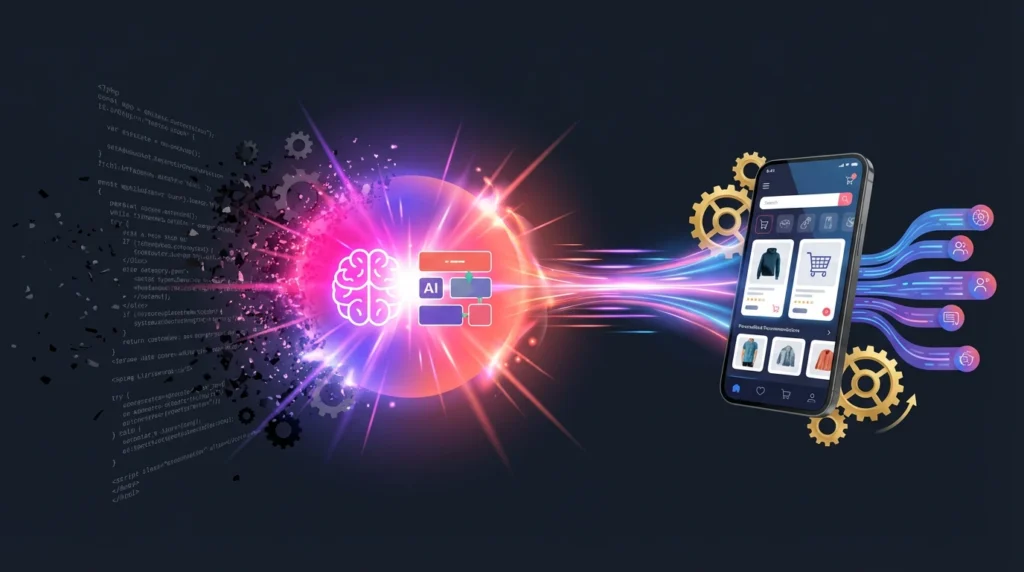
The fusion of AI and no-code technology has created a powerful synergy, shifting the power from specialized developers back to founders and product managers. This new paradigm allows teams to build tangible interfaces and fully functional applications at unprecedented speed.
Accelerating Speed, Scale, and Efficiency
The rise of the no-code e-commerce app builder leverages generative AI to eliminate manual, repetitive tasks, dramatically shortening the path from idea to functional application.
- Rapid Prototyping and Validation: Platforms excel at translating an idea or design directly into a functional app or prototype in days, accelerating the build, test, and feedback loop. For instance, some tools can create a fully functional site, complete with copy and features, in minutes, rather than hours or days.
- Operational Automation: AI automates essential operational tasks. This includes generating and editing product descriptions, streamlining refunds, managing taxes, and updating product listings. AI can potentially help retailers save up to $340 billion annually by optimizing these workflows.
- Data-Driven Customization: AI-powered systems can track and analyze massive amounts of customer data—including purchase history and social media interactions—to dynamically generate product recommendations, boosting upselling and cross-selling opportunities.
Imagine.bo: The Best AI No-Code App Builder for E-Commerce Scale

For e-commerce founders and high-growth startups, the choice of builder is a strategic necessity, not just a preference. Imagine.bo is engineered specifically to provide the speed of a no-code builder while retaining the technical quality and infrastructure required for enterprise-level scaling.
Imagine.bo’s Unique Advantages The platform’s core competitive edge lies in its approach to architecture generation, enterprise-grade scalability, and hybrid support model.
AI-Generated App Architecture from Plain English
Imagine.bo bypasses the steep learning curve and complex configuration inherent in other platforms by using natural language to build the foundational architecture of the application.
- Prompt-Driven Creation: Instead of manually configuring databases and screen hierarchies, users simply describe the desired app purpose in plain English, and the AI translates that intention into a functional app structure. Some AI builders can convert even a whiteboard sketch or Figma design directly into UI components, drastically shortening the initial design-to-code process.
- Tailored Store Generation: Similar to platforms that create a tailored store based on a simple description of the business and product categories, Imagine.bo ensures that the initial application layout, pages, and sections are immediately relevant to the user’s specific e-commerce niche (e.g., fashion, food, tech, or home essentials).
No-Code Visual Workflows for Deep Customization
Imagine.bo features an intuitive, drag-and-drop editor paired with an AI Co-Pilot, allowing for comprehensive visual customization without touching code.
- Visual Workflow Editor: Founders and marketers can define complex backend logic, integrations, and data structures using a visual interface, similar to platforms that use visual editors for fine-grained control over UI and workflows.
- AI Co-Pilot Refinement: The built-in AI Co-Pilot assists in fine-tuning the generated store, allowing users to edit the site, customize content and visuals, and easily add products, ensuring the final design aligns perfectly with their brand.
- Responsive Design Guaranteed: The platform automatically ensures the generated e-commerce app is fully responsive and optimized for all devices, including mobile, providing a smooth, quick browsing experience across smartphones and tablets.
Step-by-Step: How to Build an E-Commerce App Using Imagine.bo
Imagine.bo simplifies the application lifecycle into three clear, actionable steps: Describe, Build, and Launch. This process dramatically reduces time-to-market compared to traditional development.
- Step 1: Describe Your Vision You start by answering a few simple questions about your e-commerce business, including your store name and a brief description of what you sell. The AI uses this information to create a tailored store concept, product categories, and initial content.
- Step 2: Build and Refine with AI The AI instantly generates the complete store layout, including essential pages and sophisticated functionalities like checkout optimization. You then use the no-code visual editor and the AI Co-Pilot to customize design elements, set product categories, and integrate payment options (similar to platforms utilizing Stripe integration for payments).
- Step 3: Launch and Scale Once the design is finalized and products are added, you launch the store instantly, requiring zero technical knowledge. The app is deployed on a robust, scalable infrastructure, ready to handle traffic and transactions globally.
Enterprise-Grade Scalability and Infrastructure
Imagine.bo is built on infrastructure designed for extreme growth, eliminating the common no-code ceiling associated with limited scalability and performance.
- Cloud Infrastructure (AWS/GCP/Vercel): The platform is hosted on leading global cloud services (AWS/GCP/Vercel), ensuring high performance, security, and global coverage (similar to platforms hosted on Google Cloud servers).
- High Transaction Throughput (1,000 TPS): Imagine.bo guarantees the capacity to handle high-volume sales and up to 1,000 simultaneous transactions per second, ensuring your store remains operational even during peak sales events like Black Friday (surpassing the throughput of platforms like Wix, which handles 750 TPS).
- 99.99% Uptime and Reliability: Leveraging this resilient infrastructure, Imagine.bo offers industry-leading uptime guarantees, protecting revenue by ensuring your store is virtually always available.
Built-in Analytics, SEO Tools, and Conversion Optimization
For an e-commerce platform, functionality must be paired with measurable growth tools. Imagine.bo provides comprehensive, native features for tracking performance and optimizing search visibility.
- Comprehensive Analytics Dashboard: Users gain access to comprehensive analytics and reporting tools to track vital e-commerce metrics such as sales, conversion rates, customer behavior, and traffic sources, allowing for data-informed strategy adjustments.
- Automated SEO Optimization: The AI builder optimizes the store for search engines, automatically generating SEO-friendly content, suggesting relevant keywords, and ensuring compliance with web performance standards like Core Web Vitals (similar to the SEO optimization features found in Surfer AI and Wix).
- Conversion Maximation: Features like optimized checkout flows, reduced cart abandonment strategies, and one-click payment options (e.g., Apple Pay/Google Pay) are integrated natively to maximize conversions.
Security, Compliance, and Data Governance (GDPR, SOC2-Ready)
Trust and security are paramount in e-commerce, especially when dealing with customer data and payment processing.
- Data Protection and Compliance: Imagine.bo implements industry-standard security measures, including SSL encryption and secure payment gateways, to protect the online store and customer data. The platform is designed to be fully compliant with global data protection regulations, including GDPR, and adheres to the stringent organizational and security standards necessary for SOC2-ready status (reflecting the enterprise-grade security focus of platforms like Google Cloud and Microsoft Power Apps).
- Fraud Prevention: By integrating advanced AI tools into the payment processing layer, Imagine.bo helps protect against fraud with features like 3D Secure Authentication and handles payment disputes with ease.
The Hybrid Model: Real Human Developer Assistance When Needed
Imagine.bo avoids the common frustration of no-code platforms—hitting a technical wall—by offering a hybrid support structure. While the platform is entirely no-code, real human developer assistance is available to address complex, highly customized issues.
- 24/7 Expert Support: Similar to platforms offering round-the-clock live chat support, Imagine.bo ensures that help is available anytime users encounter questions or issues.
- Developer Backstop: For specific custom features or complex logic that cannot be solved through the visual builder, human experts are ready to step in, providing a seamless bridge between no-code simplicity and the power of custom code (akin to the dedicated support offered by some enterprise platforms).
Use Cases: Who Benefits Most from Imagine.bo?
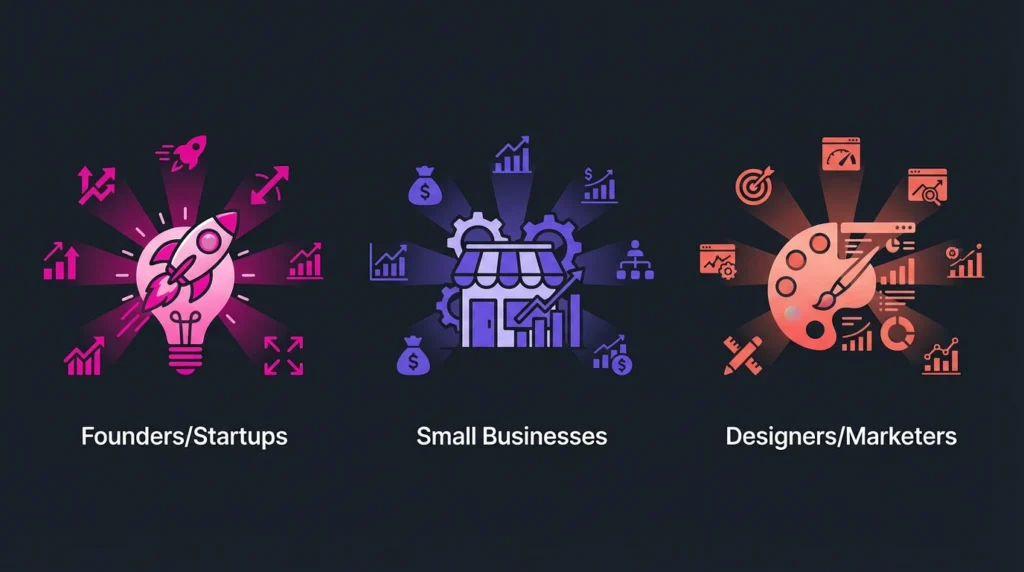
The flexibility and power of Imagine.bo make it the ideal solution for various e-commerce stakeholders looking to leverage the AI app builder for e-commerce.
Founders and Startups: Validating Scalable MVPs
Founders need speed-to-market and the assurance that their Minimum Viable Product (MVP) can grow without immediate rebuilding.
Imagine.bo enables a founder to describe their entire store concept, generate the architecture in minutes, and launch a production-ready application that is inherently scalable, avoiding the vendor lock-in often associated with traditional no-code tools. They save weeks of initial development time and budget by starting with an AI-generated foundation, allowing them to focus resources on backend integration and core business strategy. For more strategies on this, check out our guide for non-technical founders building products.
Small Businesses: Operational Efficiency and Revenue Growth
For small businesses, efficiency and cost management are paramount.
Imagine.bo streamlines daily operations by integrating AI tools for generating product descriptions, managing inventory, and handling payment disputes. The built-in analytics dashboard provides clear, actionable data, allowing small teams to make informed decisions and track the direct impact of AI-powered product recommendations on sales and average order value (AOV).
Designers and Marketers: Creative Control and Optimization
Designers and marketers often struggle with development bottlenecks, limiting their ability to iterate and test creative ideas rapidly.
With Imagine.bo, designers can translate visual concepts (like Figma designs) directly into functional UI skeletons. Marketers benefit immensely from the AI-powered tools that automate SEO content generation, launch optimized ad campaigns, and create personalized customer journeys, all managed from a unified dashboard. They can use the platform’s drag-and-drop editor and AI Co-Pilot to maintain brand consistency and fully customize design elements without needing a developer.
Comparison: Imagine.bo vs. The E-Commerce App Building Landscape
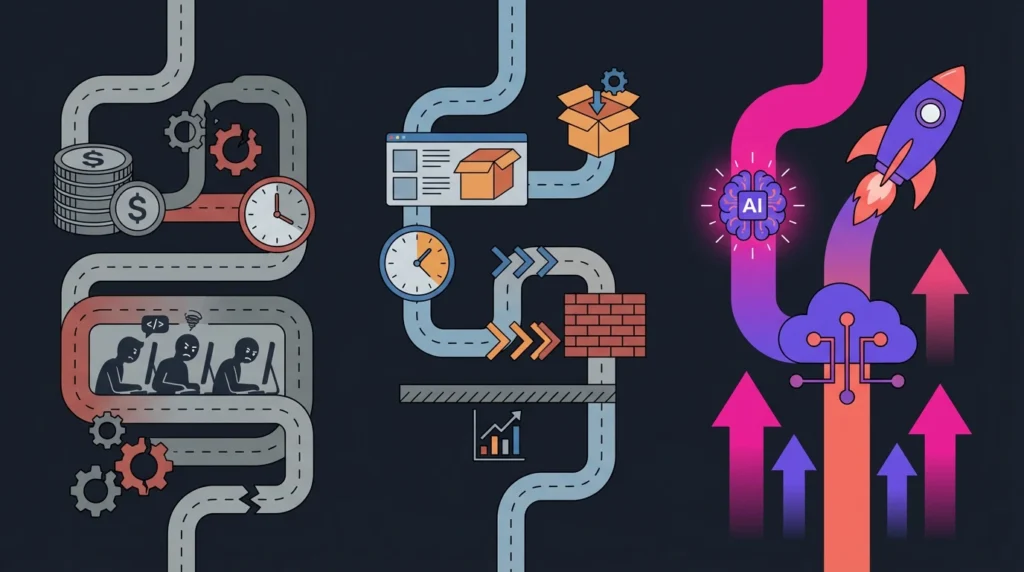
The landscape of app building is split between traditional development, closed no-code platforms, and the new wave of AI-accelerated systems. Imagine.bo occupies the sweet spot, providing the speed of no-code with the scalability of a custom solution.
Imagine.bo vs. Traditional Development (In-House Teams)
| Feature | Traditional Development | Imagine.bo AI App Builder |
|---|---|---|
| Initial Cost | High (>$10,000 estimated) | Significantly lower (Subscription model) |
| Time-to-Launch | Months | Minutes to Days |
| Scalability | High, but expensive to maintain | High (AWS/GCP, 1,000 TPS) |
| Content Generation | Manual, Time-intensive | Automated via AI Co-Pilot |
| Support | In-house team required | 24/7 Human Support + AI Co-Pilot |
| Risk | High technical debt | Low, managed infrastructure and compliance |
Imagine.bo vs. Other No-Code & AI Platforms (10Web, Wix, Shopify)
Many tools offer parts of the solution. 10Web, for instance, provides an efficient AI e-commerce website builder featuring a 3-step process, hosting on Google Cloud, and built-in payments via Stripe. Wix offers unmatched design freedom and built-in AI tools for product descriptions and image editing, but its e-commerce capabilities can lag in critical areas compared to dedicated platforms, creating bottlenecks for growing businesses. Shopify offers robustness and a massive ecosystem, but its AI features are more limited, often requiring extensive manual setup and third-party plugins for core features.
Imagine.bo excels by bridging the gap:
- Superior AI Synthesis: While platforms like 10Web offer a three-step generation process, Imagine.bo focuses on translating complex app architecture from plain English, a capability usually reserved for more code-centric tools.
- Unmatched Scalability Foundation: Imagine.bo’s guaranteed 1,000 TPS capacity on enterprise cloud infrastructure (AWS/GCP/Vercel) places it above most pure no-code providers that might face limitations as transaction volume increases (Wix handles up to 750 TPS).
- Full Compliance Assurance: By being explicitly SOC2-ready and compliant with GDPR, Imagine.bo meets the rigorous security and governance needs of modern, data-intensive e-commerce operations, offering peace of mind comparable to large enterprise solutions.
The Future of AI-Driven E-Commerce App Building
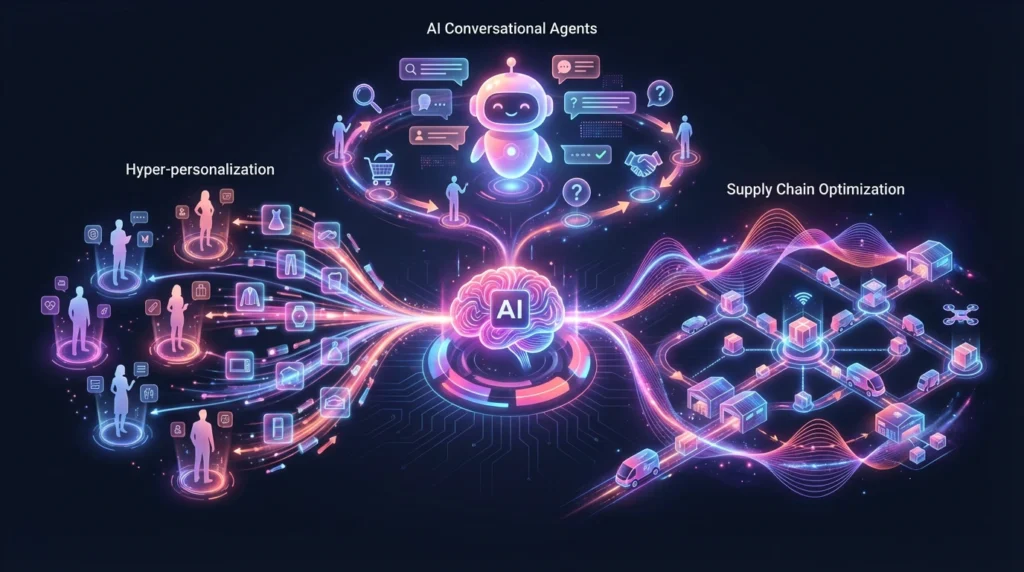
The trajectory of AI in e-commerce points toward further hyper-personalization, automation, and deeper integration into the supply chain.
AI-powered recommendation systems have already demonstrated their value by significantly increasing conversion rates, and this trend is expected to amplify as algorithms become sophisticated enough to deliver hyper-personalized product suggestions. AI will continue to revolutionize operational efficiency, improving inventory management and logistics by tracking products throughout the entire supply chain and accurately predicting lead times to avoid stock-out scenarios. Furthermore, conversational AI agents will enhance customer support by providing real-time assistance and guiding shoppers through the entire purchasing process, further boosting customer loyalty.
The tools of the future of app development, like Imagine.bo, will act as intelligent co-pilots, enabling businesses to leverage these complex advancements seamlessly. By choosing a platform built on a future-proof, scalable foundation—one that gives you enterprise control without requiring a line of code—you ensure your business is positioned at the forefront of this innovation.
The choice is clear: stop building a website and start deploying a scalable, intelligent e-commerce application.
Transform Your E-Commerce Vision into Scalable Revenue Today
The days of slow, expensive custom development are over. You now have the power to launch a high-performance, conversion-focused e-commerce application in a fraction of the time, complete with enterprise-grade security and limitless scalability.
Imagine.bo is the definitive AI app builder for e-commerce—the only platform that gives founders and businesses the speed of no-code paired with the infrastructure to handle exponential growth.
Launch Your App Today
Ready to launch? Skip the tech stress. Describe, Build, Launch in three simple steps.
Build
